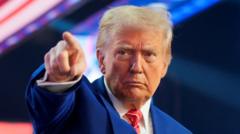Trump threatens to reclaim control of the Panama Canal, demanding fee reductions from Panama or a return of U.S. oversight, stirring international reaction.
Trump Demands Panama Canal Fee Reduction or U.S. Control

Trump Demands Panama Canal Fee Reduction or U.S. Control
Former President Trump's bold declaration at a conservative conference calls for renegotiation of Panama Canal terms.
Former President Donald Trump ignited controversy over international relations during a recent address at Turning Point USA's annual conference, rallying a sea of conservative supporters in Arizona. Speaking before an enthusiastic audience, he called on the government of Panama to lower its fees for transit through the Panama Canal, labeling them "exorbitant" and asserting they exploit American shipping and naval interests. "The fees being charged by Panama are ridiculous, highly unfair," he proclaimed, vowing that such inequitable practices would be addressed as soon as he assumes office.
The provocative remarks drew an immediate and assertive response from Panama's President José Raúl Mulino, who defended his country's sovereignty. "Every square metre of the canal is ours," Mulino stated emphatically, asserting that Panama's control and independence are not open for negotiation. Trump's rhetoric has raised eyebrows, as it suggests a radical shift in U.S. foreign policy and a willingness to exert U.S. influence over foreign territories.
The 51-mile canal, which serves as a crucial transit route between the Atlantic and Pacific oceans, was controlled by the U.S. until 1977, when a series of treaties initiated its handover to Panama, culminating in full Panamanian control in 1999. Trump's remarks revived discussions surrounding American interests in the canal, which sees approximately 14,000 vessels transit annually, transporting goods and military resources.
During his speech, Trump reiterated his broader campaign themes of immigration and trade, concurrently redirecting criticism towards Canada and Mexico for perceived unfair trade practices. Notably, he tempered his comments on Mexico's President Claudia Sheinbaum, calling her a "wonderful woman," which marked a departure from his typically aggressive rhetoric on immigration issues.
This gathering marked Trump’s first public appearance after Congress struck a deal to avert a government shutdown—a measure he supported, albeit sidestepping opportunities to discuss the political divisions currently rippling through the Republican Party. Instead, he focused on familiar topics of immigration, crime, and foreign trade, maintaining momentum within his conservative base.
As Trump's influence continues to dominate the political landscape, global observers are left to question the implications his posturing toward the Panama Canal may entail for international relations and trade dynamics should he win the presidency again in the 2024 election.



















